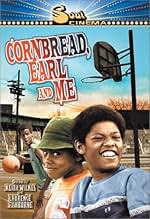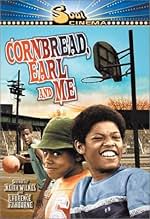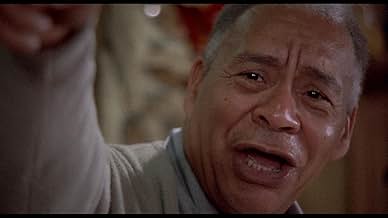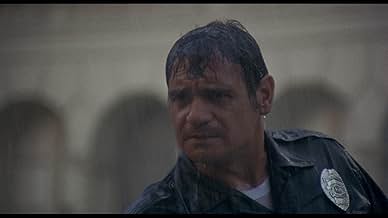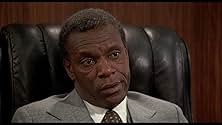IMDb रेटिंग
6.9/10
1.1 हज़ार
आपकी रेटिंग
अपनी भाषा में प्लॉट जोड़ेंA 12-year-old is traumatised by the murder of his friend, a star basketball player.A 12-year-old is traumatised by the murder of his friend, a star basketball player.A 12-year-old is traumatised by the murder of his friend, a star basketball player.
Jamaal Wilkes
- Nathaniel 'Cornbread' Hamilton
- (as Keith Wilkes)
Laurence Fishburne
- Wilford Robinson
- (as Laurence Fishburne III)
फ़ीचर्ड समीक्षाएं
10Carrj145
I was very disturbed by the negative review given by a man who actually lived during the times dramatize in "Cornbread, Earl and Me." I am a 26-year-old Black female watching this movie for the first time. I found that every issue addressed in this movie is transcendent, relevant even today.
It amazes me that we overlook the importance of a message simply because of the delivery. In all fairness to this movie, there is no blaxploitation present; the language, attire, scenery, etc., everything necessary for a realistic plot, is perfect for the setting and time frame of this movie. Regarding the comment about "ghetto language" there is a balance between the use of the formal and informal in the movie.
As an English teacher, and one who has a strong disdain for negative images of African-Americans, I can honestly say that this movie's depiction of African-American life was very well done. It was also poignant and ahead of its time. It is movie that, when the time comes, I will show to my children as a reference to how very little times have changed regarding the ease of wrongful deaths, slandering of names, harassment of witnesses because of racial advantages, or rather disadvantages.
The movie is GREAT;-)
It amazes me that we overlook the importance of a message simply because of the delivery. In all fairness to this movie, there is no blaxploitation present; the language, attire, scenery, etc., everything necessary for a realistic plot, is perfect for the setting and time frame of this movie. Regarding the comment about "ghetto language" there is a balance between the use of the formal and informal in the movie.
As an English teacher, and one who has a strong disdain for negative images of African-Americans, I can honestly say that this movie's depiction of African-American life was very well done. It was also poignant and ahead of its time. It is movie that, when the time comes, I will show to my children as a reference to how very little times have changed regarding the ease of wrongful deaths, slandering of names, harassment of witnesses because of racial advantages, or rather disadvantages.
The movie is GREAT;-)
Seeing that this is one of the first, if not the first, Hollywood movies fully to address the issue of police brutality toward African Americans, a problem that remains unsolved, I am inclined to cut this film a whole lot of slack. I am willing to overlook the Lorraine Hansbury wannabe dialogue and over the top acting, surprising for such a distinguished cast. I will even forgive the bombastic, intrusive music score. Because, however crudely at times, director Joe Manduke conveys the feel of a community oppressed as well as the difficulty of and need to stand up to the oppressor. So that by the end of the film one is both angered and stirred. And not spuriously, either Give it a B minus.
PS...One exception to the general histrionics of the acting is a very young Laurence Fishburne whose testimony at the inquest is, by far, the film's best scene. That it is also the only one without music is not, in my view, coincidental.
PS...One exception to the general histrionics of the acting is a very young Laurence Fishburne whose testimony at the inquest is, by far, the film's best scene. That it is also the only one without music is not, in my view, coincidental.
Jamaal Wilkes, Laurence Fishburne (in his first big-screen role), and Tierre Turner are shooting hoops when it begins to rain. They go into Charles Lampkin's store, and Wilkes buys treats for the other boys. He's in a good mood, because he's the first in the neighborhood who will go to college, on a football scholarship, and he will be going tomorrow. They start to banter about how fast he is, and he starts to run home in the rain. Police officers, pursuing a suspect, mistake Wilkes. They shoot him dead.
It's Moses Gunn whom Madge Sinclair and Stack Pierce, Wilkes' parent hire to get the Police admit they made a mistake, and it's Rosalind Cash, Fishburne's mother, who nurtures him. Some of the roles, like Stefan Gierasch as the cop who intimidates witnesses, are pretty much stereotypes, but that's the point of this movie: to see the Black people in it as individuals. Despite an occasionally clunky pacing, it does that very well.
It's Moses Gunn whom Madge Sinclair and Stack Pierce, Wilkes' parent hire to get the Police admit they made a mistake, and it's Rosalind Cash, Fishburne's mother, who nurtures him. Some of the roles, like Stefan Gierasch as the cop who intimidates witnesses, are pretty much stereotypes, but that's the point of this movie: to see the Black people in it as individuals. Despite an occasionally clunky pacing, it does that very well.
I'm not going to summarize the story of this movie; you can find that above.
Rather, I'll just leave my comments on the experience of watching it.
The ;movie is well acted throughout. And that can, at times, make it difficult to watch. When one of the characters is killed, it is difficult to watch his mother's at first unbelieving reaction to the tragedy. You feel something of her grief just in watching the contorsions of her face and body. It's not easy to watch.
Later, watching the police dept intimidate witnesses to avoid a wrongful homicide verdict is also difficult to watch, but in a different sense. You see how powerless the people in this poor neighborhood are to fight back against such administrative corruption. (I also suppose it doesn't make a lot of sense. I would imagine, though I don't know this as a fact, that even in 1975 police depts would have been insured against such expenses.)
It's refreshing that it is a Black lawyer who wins this suit, and not some Great White Savior.
But at the end, you have no assurance that the same thing won't happen again. And again. And again. The shooting of the young Black man was not directly an act of racism - one of the policemen who shot at him was Black himself, and they had been told the rapist they were pursuing was Black. His death is, rather, the result of sloppy procedure and very bad coincidence.
But the intimidation of the potential witnesses by police dept reps suggests that the people in this neighborhood and other poor ones like it have little access to real justice.
Rather, I'll just leave my comments on the experience of watching it.
The ;movie is well acted throughout. And that can, at times, make it difficult to watch. When one of the characters is killed, it is difficult to watch his mother's at first unbelieving reaction to the tragedy. You feel something of her grief just in watching the contorsions of her face and body. It's not easy to watch.
Later, watching the police dept intimidate witnesses to avoid a wrongful homicide verdict is also difficult to watch, but in a different sense. You see how powerless the people in this poor neighborhood are to fight back against such administrative corruption. (I also suppose it doesn't make a lot of sense. I would imagine, though I don't know this as a fact, that even in 1975 police depts would have been insured against such expenses.)
It's refreshing that it is a Black lawyer who wins this suit, and not some Great White Savior.
But at the end, you have no assurance that the same thing won't happen again. And again. And again. The shooting of the young Black man was not directly an act of racism - one of the policemen who shot at him was Black himself, and they had been told the rapist they were pursuing was Black. His death is, rather, the result of sloppy procedure and very bad coincidence.
But the intimidation of the potential witnesses by police dept reps suggests that the people in this neighborhood and other poor ones like it have little access to real justice.
I think the label of blaxploitation for this film is quite unfair- it's heartfelt, various Black and White characters are shown as flawed rather than the "us vs. them" mentality of many racially charged films of that era- and you deeply care about what happens to everyone involved. Plus Moses Gunn is as fine an actor as ever set foot on the silver screen. Just thoroughly enjoyed it in spite of low budget feel and some clichéd moments. I even got choked up at times. Well worth seeing. Additionally, I was quite saddened to find that so many of the cast died relatively young. For a film from the mid 70s, there's an awful lot of actors in this movie no longer with us.
क्या आपको पता है
- ट्रिवियाLaurence Fishburne's film debut. He is credited as Laurence Fishburne III.
- गूफ़When a clay pot is thrown at Officer Atkins and hits the windshield of his cruiser, it breaks. Pieces of glass hit Atkins and embed in his face. But windshields are made of safety glass and though windshields break, they keep the glass in place. So, the glass in this windshield would NOT have flown at Atkins, let alone embed in his face. He would have come out of this situation shaken but physically unharmed.
- भाव
Wilford Robinson: ...they killed Cornbread and he wasn't doin' nothin'
[pause]
Wilford Robinson: all he was doin wuz jus goin' home...
- कनेक्शनFeatured in Dusk to Dawn Drive-In Trash-o-Rama Show Vol. 2 (1996)
टॉप पसंद
रेटिंग देने के लिए साइन-इन करें और वैयक्तिकृत सुझावों के लिए वॉचलिस्ट करें
- How long is Cornbread, Earl and Me?Alexa द्वारा संचालित
विवरण
- रिलीज़ की तारीख़
- कंट्री ऑफ़ ओरिजिन
- आधिकारिक साइट
- भाषा
- इस रूप में भी जाना जाता है
- Hit the Open Man
- फ़िल्माने की जगहें
- उत्पादन कंपनियां
- IMDbPro पर और कंपनी क्रेडिट देखें
बॉक्स ऑफ़िस
- बजट
- $8,00,000(अनुमानित)
इस पेज में योगदान दें
किसी बदलाव का सुझाव दें या अनुपलब्ध कॉन्टेंट जोड़ें



